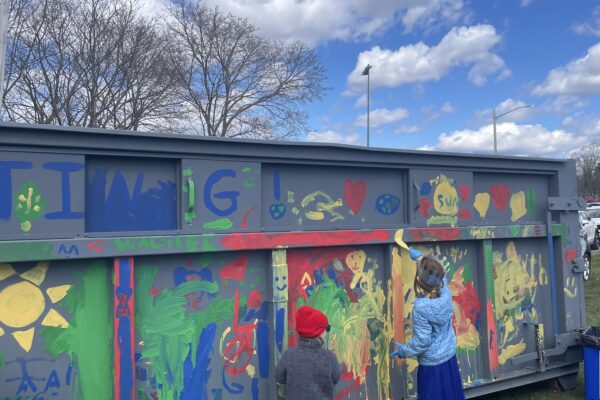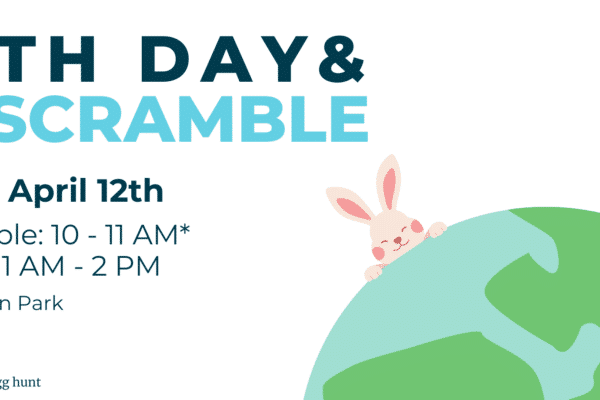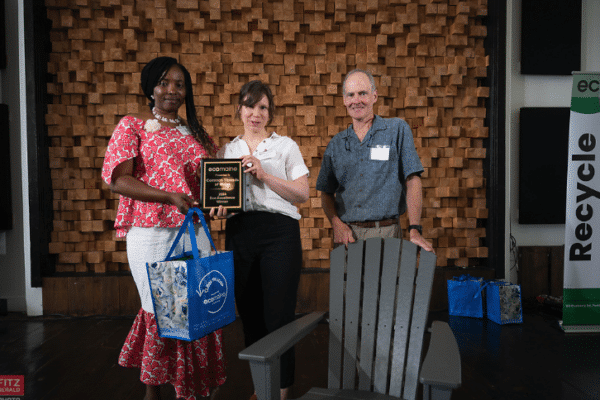And How to Avoid Them!
At ecomaine, we understand that recycling can be confusing. While many Mainers value recycling as a way to reduce waste and protect the environment, many still don’t know what can actually be recycled. This often leads to “wishcycling,” where people throw everything into the blue bin and hope for the best. Unfortunately, this practice can complicate the recycling process and harm valuable materials. But don’t worry- you’re not alone! Let’s go through the most common recycling mistakes, and set the record straight.
1.Packing Recyclables in Plastic Bags
Many of us use plastic bags to collect recyclables, but at ecomaine these plastic bags actually cause hazards in our facility by getting stuck in our recycling equipment, causing our workers have to crawl into the system and cut them out.
What to Do Instead: Keep it loose and don’t bag recyclables! Make sure your recyclables are free of liquids and food residue, which eliminates the need for bags altogether.
2. Forgetting About The Waste Hierarchy
The mantra is “reduce, reuse, recycle” for a reason—reducing and reusing are far more effective at minimizing waste.
What to Do Instead: Bring your own bags to the store, buy in bulk, or repurpose items like glass jars for storage. These small changes can have a big impact. We also encourage composting for your organics! There are many great options for backyard, drop-off locations, and curbside pickup.
3. Not Knowing Ecomaine Recycling Rules
Recycling guidelines vary widely between municipalities. What’s acceptable in one area may not be in another. This leads to confusion when people move from one area to another.
What to Do: Check ecomaine’s website or your local government’s site to learn the specific rules for your area. Knowledge is key!
4. Not Checking Your Packaging Materials
While cardboard is recyclable, materials like Styrofoam, packing peanuts, and bubble wrap are not.
What to Do Instead: Separate packing materials from the cardboard and only place the pure cardboard in the recycling bin.
5. Tossing Dirty Pizza Boxes in Trash
Though pizza boxes don’t seem recyclable due to the grease and food residue, we can still accept them at ecomaine!
What to Do Instead: Recycle your pizza boxes! While cold pizza makes a good snack, make sure the box is empty.
6. Including Plastic Wrap in Your Recycling Bin
Plastic wrap, plastics bags, and other plastic packaging that often has a recycling symbol on it, while commonly used, aren’t accepted in curbside recycling bins.
What to Do Instead: Take plastic wrap and bags to designated recycling centers or participating stores such as Target, Hannaford, or Walmart.
7. Not Emptying Out Plastic Containers
Even the correct kind of plastic can’t be recycled if it’s dirty. Food residue can lead to contamination and unpleasant odors. They don’t have to be pristine, but make sure they’re empty.
What to Do Instead: Clean your containers to ensure they’re free from food and liquids before recycling.
8. Throwing Styrofoam in the Recycling Bin
Styrofoam products can’t be recycled, it’s often not feasible due to the material being mostly made of air, and it can contaminate other recyclables.
What to Do Instead: Dispose of Styrofoam in the trash, or better yet, try to avoid using it altogether.
9. Uncertainty About Recycling Milk Cartons
Milk cartons can be a gray area in recycling—but ecomaine accepts all milk cartons!
What to Do Instead: Look for glass returnable options, and take back programs. Also feel free to throw those in the recycling, but drink the milk first.
10. Not Taking Advantage of ecomaine’s Resources!
ecomaine has a variety of educational resources and tools for community members to use at their convenience. From our Environmental Educators who will come into schools and schedule tours of the facilities, our free downloadable educational materials, and our Recyclopedia, we have all the resources you might need.
What to Do Instead: Check out our Recyclopedia for all of your disposal questions, download our materials, and contact our education department to schedule presentations and tours.
By understanding these common pitfalls and making small adjustments, you can greatly improve your recycling efforts. At ecomaine, we’re here to help you navigate the recycling landscape and make a positive impact on our environment!



